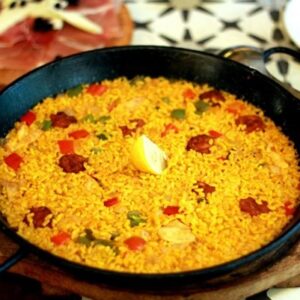
1. Paella
Paella is perhaps the most iconic Spanish dish, originating from the region of Valencia. This flavorful rice dish is traditionally cooked in a wide, shallow pan and can be made with a variety of ingredients, including seafood, chicken, rabbit, and vegetables.
Paella is not just a meal but an experience that brings people together. It is often enjoyed during festivals and family gatherings, symbolizing unity and celebration. The combination of fresh seafood, tender meats, and aromatic spices makes paella a true representation of Spanish hospitality and culinary excellence.
- Ingredients: Rice, saffron, olive oil, seafood (shrimp, mussels, squid), chicken, rabbit, green beans, and tomatoes.
- Tips: To experience authentic paella, visit a traditional restaurant in Valencia. Look for places that use a wood fire to cook the dish, as this imparts a unique smoky flavor.
2. Tapas
Tapas are small, flavorful dishes that are typically served as appetizers or snacks. They are perfect for sharing and provide a great way to sample a variety of Spanish flavors in one meal. Tapas can range from simple dishes like olives and cheese to more complex creations like croquettes and stuffed peppers.
- Popular Tapas:
○ Patatas Bravas: Fried potatoes with a spicy tomato sauce.
○ Gambas al Ajillo: Garlic shrimp cooked in olive oil.
○ Jamón Ibérico: Cured Iberian ham.
Exploring the tapas culture is a must when visiting Spain. Tapas bars are lively places where locals and tourists alike gather to enjoy a variety of small plates while socializing. Each region in Spain offers its unique take on tapas, allowing you to taste a diverse range of flavors and ingredients.
3. Chorizo
Chorizo is a type of pork sausage that is deeply embedded in Spanish culinary tradition. It is seasoned with smoked paprika, which gives it a distinctive red color and rich flavor. Chorizo can be enjoyed in various forms, from fresh and grilled to cured and sliced.
- Where to Try: Look for local markets and specialty stores where you can sample and purchase different types of chorizo. For a convenient option, you can also check out Chorizo here — https://www.gourmetfoodstore.com/wagyu-beef-and-specialty-meats/chorizo-0996.
Chorizo is incredibly versatile and can be used in numerous Spanish dishes. It adds a burst of flavor to stews, soups, and rice dishes. Whether you enjoy it as a tapa or incorporate it into your favorite recipes, chorizo is a must-try for any food enthusiast visiting Spain.
4. Gazpacho
Gazpacho is a refreshing cold soup that is perfect for hot summer days. Originating from Andalusia, this tomato-based soup is blended with cucumbers, bell peppers, onions, garlic, and olive oil. It is usually served chilled and garnished with croutons or diced vegetables.
Gazpacho embodies the essence of Mediterranean cuisine, focusing on fresh, seasonal ingredients. It’s a healthy and delicious way to experience the flavors of Spain, particularly during the warmer months. Many restaurants offer their unique versions of gazpacho, so be sure to try a few different styles.
- Ingredients: Tomatoes, cucumbers, bell peppers, onions, garlic, olive oil, vinegar, and bread.
- Serving Tip: Enjoy gazpacho as a light starter or a refreshing drink. It’s a great way to cool down while exploring the sunny streets of Spain.
5. Tortilla Española
Tortilla Española, also known as Spanish omelette, is a simple yet delicious dish made from eggs, potatoes, and onions. It can be served hot or cold and is often enjoyed as a tapa or a light meal.
The Spanish omelette is a staple in Spanish households and is often made for family meals and gatherings. Its simplicity is deceptive, as achieving the perfect texture and flavor requires skill and patience. Each bite of tortilla Española offers a comforting taste of home-cooked Spanish cuisine.
- Ingredients: Eggs, potatoes, onions, olive oil, and salt.
- Cooking Tip: To make a perfect tortilla, slowly cook the potatoes and onions in olive oil until tender, then mix with beaten eggs and cook until the omelette is set but still slightly runny in the center.
Bringing the Flavors of Spain to Your Kitchen
Experiencing Spanish cuisine doesn’t have to end with your trip. Here are some tips for bringing the flavors of Spain to your kitchen:
- Use Quality Ingredients: Spanish cuisine relies on fresh, high-quality ingredients. Invest in good olive oil, fresh vegetables, and authentic Spanish spices like saffron and smoked paprika
- Embrace Simplicity: Many Spanish dishes are simple to prepare but require attention to detail. Focus on getting the flavors right and don’t overcomplicate the recipes.
- Practice Patience: Some dishes, like paella and tortilla Española, require slow cooking and patience. Take your time to let the flavors develop fully.
Exploring Spanish Food Culture
Bringing Spanish cuisine into your home also means embracing the culture and traditions that come with it. Spanish meals are often social occasions, meant to be enjoyed with family and friends. Consider hosting a Spanish-themed dinner party where you can share tapas, paella, and other traditional dishes with your loved ones.Continuing Your Culinary Journey
Spain’s rich culinary landscape offers endless opportunities for exploration. From regional specialties to modern interpretations of classic dishes, there is always something new to discover. Use your experience in Spain as a starting point to continue learning about and experimenting with Spanish cuisine in your own kitchen.
With these tips and a passion for good food, you can keep the spirit of your Spanish culinary adventure alive long after your trip has ended. Bon appétit!